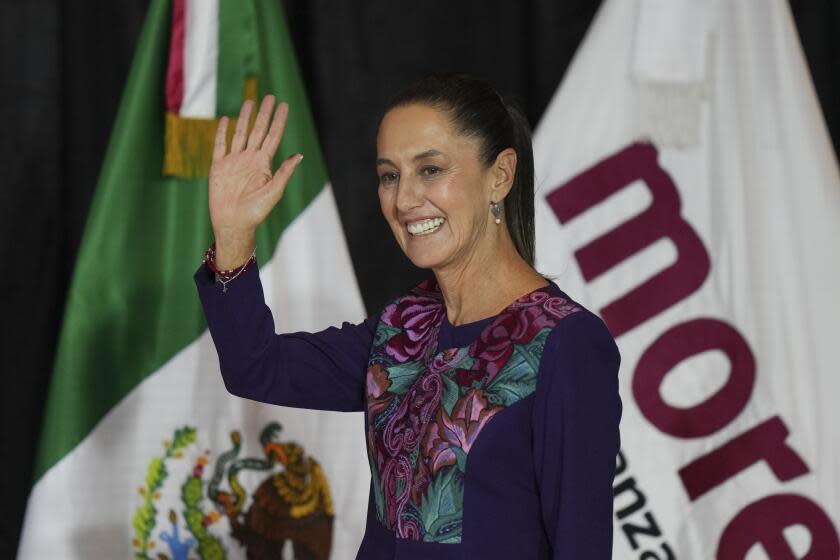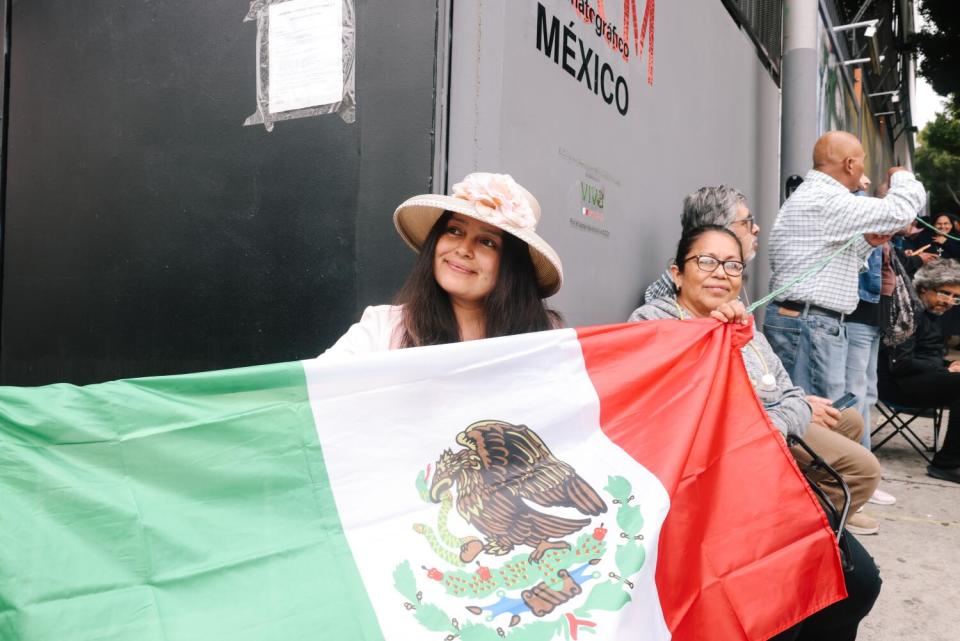Column: What Mexico's historic presidential election can teach the U.S.

Of the many terrible things that have been said about Mexico's supposed inferiority to its northern neighbor, the most damning wasn't even uttered by a gringo.
“Poor Mexico: So far from God, so close to the United States.”
Attributed to 19th century Mexican dictator Porfirio Díaz, the lament first bubbled up in the mainstream American press during the 1940s and has been rubbed in the faces of Mexicans ever since. Even though there's no proof that Díaz actually said the apocryphal quote, I get why it has lingered: It’s a great insult on multiple levels.
It portrays the country of my parents as forever lesser than the United States. It makes Mexico out to be lawless and unholy. Putting those words in Díaz's mouth implies that Mexico’s government is condemned to lawlessness and strongmen.
Well, who’s crying now?
On Sunday, Mexico elected Claudia Sheinbaum as president, and history was made in a way that makes American politics seem as antiquated as the Whigs.
Sheinbaum will become the first female president of a country long cast as a macho wasteland. Of Jewish heritage, she’s the first non-Christian to assume the presidency in a nation where Catholicism still holds the country’s psyche, if not its pews. She handily beat another woman, Xóchitl Gálvez Ruiz, who made history even while losing by becoming Mexico's first female runner-up in a presidential election.
The United States, by the way, has broken only the last of those barriers.
Read more: Mexico elects leftist Claudia Sheinbaum as the first female president in its history
Sheinbaum will be sworn in Oct. 1. By then, the eyes of the world will be focused on the U.S., where a far different presidential campaign will be wheezing to its end. The top candidates are two old white guys who have held the job before and are repeating their face-off from four years ago. Joe Biden is running on his fourth Democratic presidential ticket. Donald Trump is the Republican Party's presidential nominee for the third straight election.
It's the type of hoary leadership that Americans have long associated with Third World countries — but nope, this is the U.S. in 2024.
Americans have snidely looked down on Mexico’s government for decades while holding ours up as a beacon for the rest of the world to emulate. But in 2024, which country can boast of a better track record in its presidential milestones?
Mexico elected a Black president, Vicente Guerrero, in 1829, when the U.S. Constitution still considered a slave to be three-fifths of a person and didn't give freedmen the right to vote. The first Mexican president of Indigenous descent, Benito Juarez, assumed office in 1858, when the U.S. government was still pursuing a campaign of extermination against Native Americans.
Josefina Vázquez Mota became the first female presidential candidate for a major Mexican party four years before Hillary Clinton became the first in the U.S. In 2018, current president Andrés Manuel López Obrador was the first winner who wasn’t a member of Mexico’s two traditional top parties, PAN and the PRI. In this country, candidates who aren't Democrats or Republicans are treated as weirdos who threaten civilization — as are the people who vote for them.

This weekend, consulates around the U.S. offered in-person voting for a Mexican presidential election for the first time but weren't prepared for the hours-long lines of people excited to take part. The turnout — 60% so far — lags behind the 66% of Americans who voted in the 2020 presidential election. But most Mexicans filled out their ballots with optimism, while we did so with dread.
Mexico’s democracy is nowhere near perfect, of course. Antonio López de Santa Anna served a total of 11 terms as president, while Díaz ruled with an iron fist for 35 years. For most of the 20th century, presidential elections were the domain of one party, the PRI. In the present day, violence against political candidates, particularly those running for local office, persists. At least 37 candidates were assassinated in the months leading up to Sunday’s elections, and hundreds more were threatened, to the point that López Obrador’s administration assigned them security guards.
Sheinbaum needs to prove she’s more than just an acolyte of her mentor, López Obrador, whom critics portray as a leftist version of Trump for his cult of personality, imperious attitude toward haters and desire to hold onto power even if he’s not officially in office. On social media, Gálvez complained that she faced "unequal competition against the entire state apparatus dedicated to favoring its candidate," even as she conceded her defeat because "I am a democrat and I believe in institutions."
Read more: Mexico's presidential race is between two women. So why is everyone talking about one man?
But the fact remains: Mexico's democracy worked Sunday, at least on the presidential level. Mexicans treated the election as a chance to elect a new leader, not an apocalyptic referendum on the nation’s future, the way that too many Americans view the Biden-Trump rematch. Despite her grumbling, Gálvez isn’t crying about a stolen election — something that has actually happened in Mexico — while Trump continues to insist he was the rightful winner in 2020.
Sheinbaum’s opponents aren't threatening an insurrection, as Trump supporters did on Jan. 6 by storming the Capitol. And never in Mexico's history has a convicted felon dared to run for the presidency, let alone with a shot of winning, as Trump now does.
Poor Mexico, indeed. So close to the United States, which is so far from a democracy that inspires hope.
This story originally appeared in Los Angeles Times.


